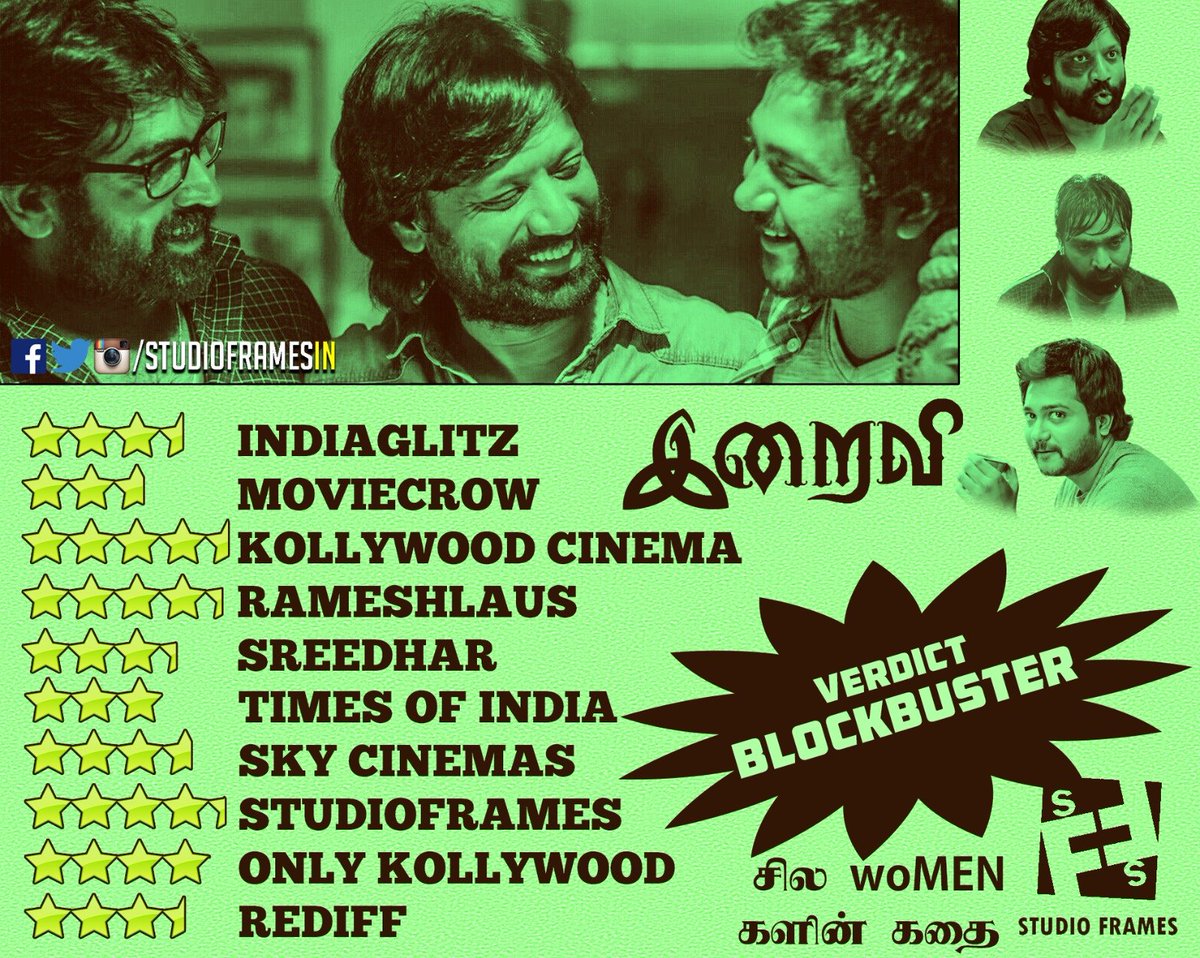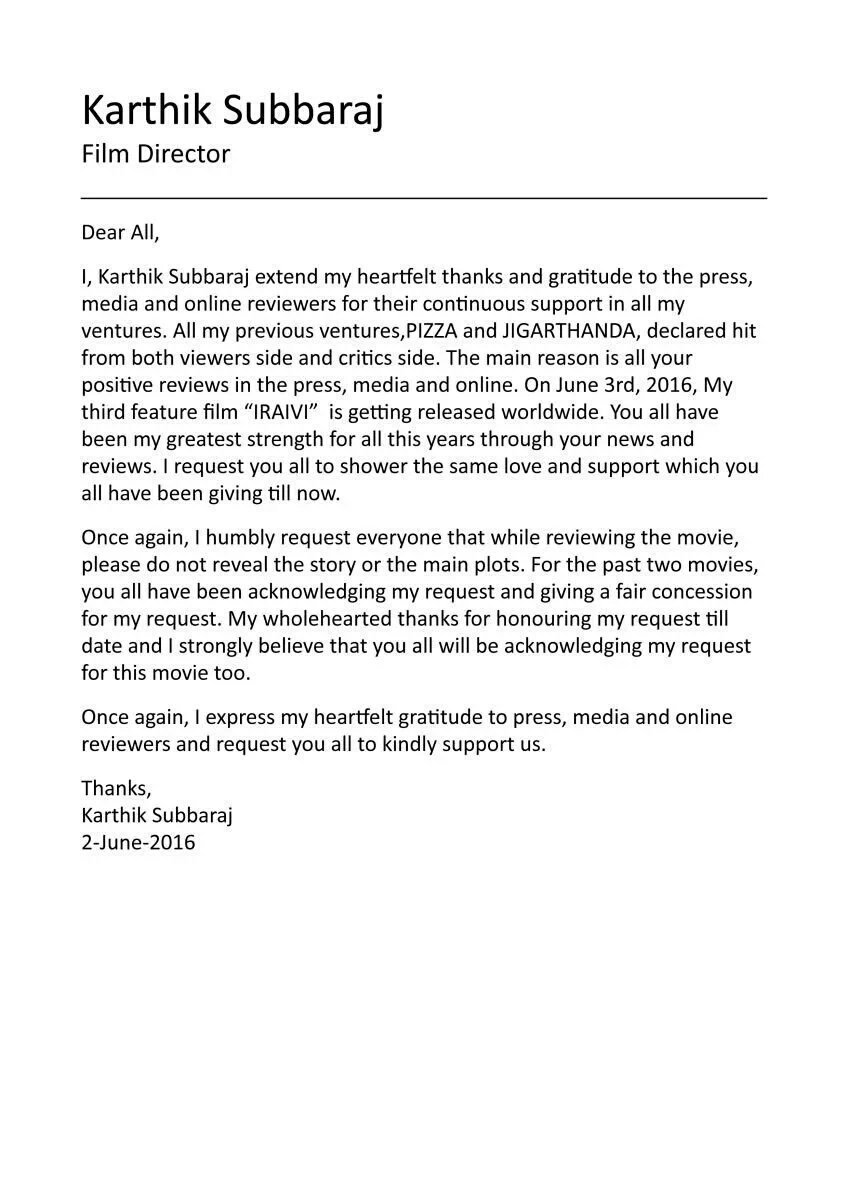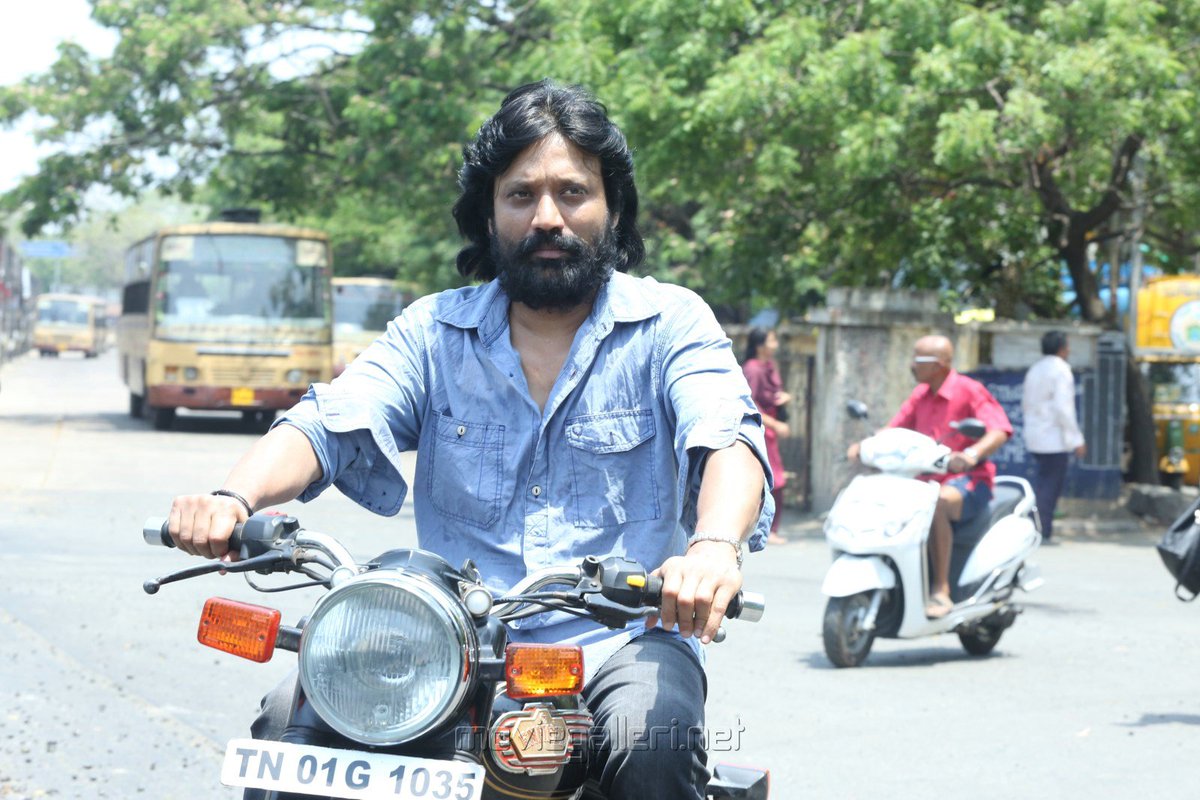-
6th June 2016, 03:50 PM
#11
Senior Member
Veteran Hubber
 Studio Frames @StudioFramesIn
Studio Frames @StudioFramesIn
#Iraivi Clean Blockbuster !! Dont Miss To Watch This Classic Movie In Theatres !! Congo @karthiksubbaraj & Team 

Dane Dane Pe Likha Hai Khane Wale Ka Naam
-
6th June 2016 03:50 PM
# ADS
Circuit advertisement

-
6th June 2016, 03:58 PM
#12
Senior Member
Veteran Hubber
Dane Dane Pe Likha Hai Khane Wale Ka Naam
-
6th June 2016, 04:03 PM
#13
Senior Member
Veteran Hubber
karthik subbaraj @karthiksubbaraj Jun 3 #Iraivi is now all urs.Sure it will be a worthy experience in theaters.PLS DONT REVEAL STORY!! sincere request.Thanks for d support so far..
850 retweets 1,680 likes
Dane Dane Pe Likha Hai Khane Wale Ka Naam
-
6th June 2016, 04:04 PM
#14
Senior Member
Veteran Hubber
Fab Flickz @FabFlickz Jun 3 #Iraivi is a bold & different film with wonderful performances & best craftsman work by @karthiksubbaraj.
Dane Dane Pe Likha Hai Khane Wale Ka Naam
-
6th June 2016, 04:07 PM
#15
Senior Member
Veteran Hubber
kollywood @cine_news1 Jun 3 #iraivi stellar performances from Vj sethupathi and sj surya @karthiksubbaraj Vera level director of cinema
 @iam_SJSuryah @VIJAYSETHUFANS
@iam_SJSuryah @VIJAYSETHUFANS
Dane Dane Pe Likha Hai Khane Wale Ka Naam
-
6th June 2016, 04:08 PM
#16
Senior Member
Veteran Hubber
Dane Dane Pe Likha Hai Khane Wale Ka Naam
-
6th June 2016, 04:10 PM
#17
Senior Member
Veteran Hubber
Dane Dane Pe Likha Hai Khane Wale Ka Naam
-
6th June 2016, 04:13 PM
#18
Senior Member
Veteran Hubber
Dane Dane Pe Likha Hai Khane Wale Ka Naam
-
6th June 2016, 04:15 PM
#19
Senior Member
Veteran Hubber
Bejoy Nambiar @nambiarbejoy 6h6 hours ago Every performance was superlative but @iam_SJSuryah just KNOCKED it out of the park ! He just blows u away in #Iraivi
Dane Dane Pe Likha Hai Khane Wale Ka Naam
-
6th June 2016, 04:16 PM
#20
Senior Member
Veteran Hubber
Baradwaj Rangan
“Iraivi”… An interesting feminist film that subverts “you go, girl” clichés
Posted on June 3, 2016
Spoilers ahead…
Dear Karthik Subbaraj,
Congratulations on yet another interesting movie, and for resisting the impulse to name this one, too, after a food item. Iraivi is an unusual feminist film, in the sense that it’s seen entirely through the prism of sympathetic male characters. Your men aren’t monsters who drink or cheat on their wives or subject them to torture. They do these things, yes, but… differently. Arul (SJ Surya) drinks, but only to drown out his sense of failure – he’s a director and his film is in the cans, being held hostage by a sadistic producer. Michael (Vijay Sethupathi) has sex with Malarvizhi (Pooja Devariya), and he continues to lust after her after his marriage to Ponni (Anjali) – I love that all your women have names that suggest classical heroines, including Arul’s wife Yazhini (Kamalini Mukherjee) – but it’s a marriage he committed to in a hurry and he still hasn’t reconciled himself to it. He’s being a bastard, certainly, but he’s not a one-note villain. And the torture they inflict isn’t the stubbing-a-cigarette-into-the-wife’s-bare-arm variety. It’s more mental than physical.
So we get women who are collateral damage – and I include Arul’s comatose mother (Vadivukkarasi), and the nurse who’s not allowed to do her duty – of men being men. They’re being babies, really. Yazhini tells Arul that he should get on with his life, write another story, make another movie. He says it’s like her trying to have another child while still pregnant with their daughter. (Yes, all these men end up with girl children.) He’s a wallower – but maybe all artists are. You like to do that, don’t you Karthik? Even in a film like this, you deliver a commentary about filmmaking and the artist. Why, even Arul’s father is a sculptor, and though we never see him ill-treating his wife (thank you for sparing us the clichés of raised hands and raised voices), we’re informed that he’s responsible for her state. His son’s following the father’s footsteps. Maybe you’re trying to say that the wives of obsessed artists are doomed to become collateral damage. Your films make us think, Karthik, so thank you for that.

All your stories have at their centre a filmmaker, or at least (in the case of your first film, Pizza) a storyteller. And through them, we seem to hear your voice. “Works of art should not be in places where they are not respected.” “Namma padam pesanum, naama pesa koodadhu.” You compare masala movies to a massage with a happy ending. (I laughed, but please don’t judge me when I say I rather like massages with happy endings – I refer to masala movies, of course.) We even get a line of dialogue about Dolby Atmos. (What will the B/C-centre audience make of this, Karthik? But then you don’t really give a shit, do you? More power to you.) And you like your insider jokes. That crass, egoistic producer who does not care about art – he reminded me of the crass producer from your earlier film, Jigarthanda. You like Rajinikanth too. You referenced Thillu Mullu in Pizza, Thalapathi in Jigarthanda, and now you have Arul singing Malayala karayoram, Michael singing Oorai therinjikitten.
Or is that more of an Ilayaraja homage? You like to keep the audience guessing, right? When the Bobby Simha character in Jigarthanda said he was a Shankar-Ganesh fan, it appeared that you were mocking the endless Ilayaraja nods in Tamil cinema, but here you are, doffing your hat to the maestro. “Raja Raja dhaan.” Arul says this… twice. (By the way, which is that nightclub which plays Maanguyile poonguyile? Do let us know.) And the reuse of Unnai thaane – first in a scene between Michael and Malarvizhi; later in a scene between Michael and Ponni – is the kind of Easter egg we come to your films for. Let me list some others, though I’ll probably need to watch the film a second (or third) time to get them all. The name of the bachelors’ quarters is Ambal Mansion – it goes with your theme and title. I didn’t get the bit about the windmills (something connected to the gust of wind that makes the row of cycles fall over in the first scene?), or why you showcased the book of Shanta Shishunala Sharif’s poems. (I confess. I Googled up that name. I can’t remember the last time a Tamil film made me Google something up. Madras, maybe.) And despite your note at the beginning that Iraivi is inspired by the works of K Balachander (he made female-centric films, but I don’t know if I’d call them feminist films), this is really more of an ode to Mani Ratnam, isn’t it? Specifically, Aayidha Ezhuthu. The three men, one of them – the impulsive one – named Michael. The film starting out as Arul’s story, then becoming Michael’s story, and finally Jagan’s (Bobby Simha) story. The finale with the woman on the train. Plus, the arc of the Madhavan-Meera Jasmine plot was essentially about being easily misled (in the case of the man) and becoming collateral damage (in the case of the woman.) And yes, the rain. All that rain. As though the skies were weeping for these women.
Am I digressing, Karthik? If I am, I’m just following your style, which is the opposite of simple and linear. As a result, I find your films longer than they need to be. (You may feel the same about my reviews.) For instance, I did not care for the scene in the nightclub where a director is felicitated. I realise it was there as a last straw for Yazhini, but it felt redundant. But I suppose they couldn’t be any other way, because you like these shaggy-dog stories that you then embellish with novelistic detail. I love the way you introduce your characters, the time you take with them. Our films lay out characters and their relationship to each other the minute we set eyes on them, but you make us wait to know how Arul is related to Jagan and where Michael fits in and so on. And when it appeared that a semblance of a plot was kicking in (something about Arul needing money to buy back his film), I dug out my phone and checked: it was a whole hour into the movie. Borrowing an image from Malarvizhi’s profession (oh wait, she’s an artist too; she’s literally an artist), it’s like daubs of paint slowly forming a bigger picture.
And you really like an expansive canvas. Not only does the crass producer have a brother, you also bring in his wife later on, to conclude a deal he began making. These segments practically form a mini-movie, with another woman left reeling by the actions of her man. Your films have this… density. They’re packed – with characters, with complications, with information doled out in bits and pieces. (A character says, “Un kitta onnu sollanum.” And instead of hearing what he has to say, we cut to someone else.) Take the scene where Michael asks Arul for money he is owed. You just need to get Michael to Arul’s antiques shop, so the next part of the plot can be staged. Arul could have told Michael to collect the money at the shop. Instead, this is what we get. Arul tells Michael to wait for a week, when he can get the 50 lakhs he is owed. Michael says he wants only 10 lakhs. Arul says he has only 8 lakhs, he’ll give the remainder later. Michael goes to Arul’s father, in the hospital. He has only 5 lakhs. And he directs Michael to the shop, to get the remaining 3 lakhs. Your signature intercutting adds to this texture, Karthik. Shots of Michael and Arul’s father in the hospital are intercut with shots of Arul hunting for booze. Shots of Michael and Jagan outside a courtroom are intercut with shots of Arul being consoled by his father. Happenings are stretched and meshed the way they would be in real life, and not compacted according to the page-per-minute requirement of screenplay-writing textbooks.
I could never predict where the film was going (win!), what these people were going to do (again, win!) –though I must admit I found this to be the weakest of your “twists.” The subplot about stealing sculptures, too, I found rather conceit-y, something half-heartedly cooked up to fit with the title and the theme, rather than something plausible, something these people would do. When Michael, here, commits murder, with a hammer, I went, “This mild-mannered chap? Really?” But then, even in Jigarthanda, I wasn’t quite convinced that the characters would do the things they did. They seemed to be puppets of a screenplay rather than credible human beings, whose actions evolve organically from who they are (or at least, who they seem to be).
But even if I am not convinced by the overall trajectory of your characters, I love how fleshed-out they are on a moment-to-moment basis. I loved the scene where Arul barges into Yazhini’s house, after their separation, on the day of her engagement to someone else. In a lesser film, she would have asked him to get out, and he’d have dug his heels in, and she’d have cooled down and… But here, she rushes straight into his arms. And you make us see why. She was frustrated, fed up with him. But she’s also confused. Was she hasty in abandoning this man? Should she move on with another man? Does she even need a man? With just this one scene, you’ve compensated for the underwritten heroine of Jigarthanda. The story arc may be Arul’s, but Yazhini registers as a fully formed character. Similarly, Michael’s arc allows for the delineation of Ponni and Malarvizhi, and through Jagan, we get glimpses of his mother, and possibly of all womanhood as viewed by a compassionate man. And then you say that women don’t need even this compassionate man (poor chap!), that they have to emancipate themselves instead of looking for a penis-wielding emancipator. What delicious irony, given that you begin the film with women talking about marriage, tying themselves to a man!
Or not, in the case of Malarvizhi, who is easily the film’s most interesting character. Her husband is dead, and she doesn’t want love anymore – only sex. When Michael buys her a diamond necklace, she gives it back to him – she can buy her own trinkets, thank you very much. But the character feels shoe-horned into the film, Karthik. I felt betrayed – and I bet she did too – that after a point, she was used simply as a plot device to get Michael and Ponni together, and also to illustrate Michael’s (who is now standing in for all of mankind) hypocrisy. I felt she deserved more. And yet, I appreciated your generosity in fleshing her out like all the others, without judging her. She gets to be the rare woman in Tamil cinema who dumps the man, and the way she lets go of Michael is echoed in the way Arul lets go of Yazhini, with a heavy heart and some playacting. A side effect of the Malarvizhi subplot is the reassurance that Vijay Sethupathi is still interested in making cinema, rather than just massy entertainers targeted at the box office.
Ponni gets a better deal (and Anjali is terrific, raw and expressive in a way she has never been). In a great scene – rather, a set of book-ending scenes – Michael tells Ponni that he was forced to marry her, and she’s going to have to “adjust” to this if she wants to be with him. Much later, she throws the “adjust” word back on his bearded face when he asks her if she slept with someone else. In a different kind of movie, we’d be invited to see this symmetry, stand up and applaud. But you’re too subtle for that, Karthik. Iraivi is your subtlest film. Which is why I winced at the melodramatic lines about men and women, most of which came towards the end. Aan, using the long-sounding vowel, versus penn, with the shorter one – for such a visual filmmaker (this is another outstandingly shot film, less showy than Jigarthanda and probably richer for that), do you really need the crutch of linguistic special effects from another era of filmmaking? Also, when the rest of your film is so allusive, isn’t there another way you can explain the twist without having a character resort to such an inelegant information dump?
And why is it that your films come together more in the head than in the heart? Why are they easier to admire than love wholeheartedly? I used to think it was because your characters are essentially deceitful, self-serving and unsympathetic, so though we were invested in what they did, we didn’t really warm up to them. But here, you have Ponni and Yazhini and Malarvizhi – and they’re still remote. But perhaps this is bound to happen when there are so many people, so many strands, when we don’t follow one person’s simplistic “you go, girl” journey like we do in, say, 36 Vayadhinile? But when the parts are so well-crafted, we don’t complain as much about their sum not adding up to a satisfying whole. I am sure that you will, one day, make that wholly satisfying film, but for now, thank you for these parts. Thank you for the ambition. I felt there were too many songs (some good work by Santhosh Narayanan), but thank you for ensuring that they don’t break character, the way songs usually do when a character speaking in his or her voice suddenly segues into the playback singer’s voice. Thank you for giving us SJ Surya, the actor – I never dreamed he had such a capacity to hold a scene, to hold the screen. Thank you for continuing not to sell out. Thank you for trying to do so much, even if not all of it needed to have been tried. And thank you for making me fight with myself, for not making it easy to decide if you’ve made a “good” film or a merely “okay” film. For now, Iraivi is a fascinating film, and that’s enough.
Dane Dane Pe Likha Hai Khane Wale Ka Naam
Studio Frames @StudioFramesIn

Studio Frames @StudioFramesIn

@iam_SJSuryah @VIJAYSETHUFANS

Kaushik (LMK) @Lmkmoviemaniac

Bookmarks